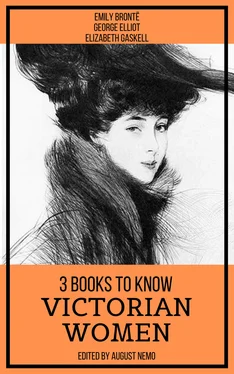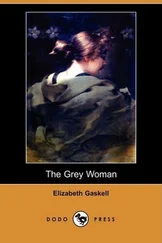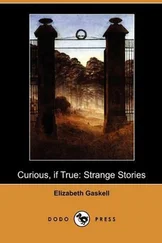All people, young or old (that is, all people in those ante-reform times), would have thought her an interesting object if they had referred the glow in her eyes and cheeks to the newly awakened ordinary images of young love: the illusions of Chloe about Strephon have been sufficiently consecrated in poetry, as the pathetic loveliness of all spontaneous trust ought to be. Miss Pippin adoring young Pumpkin, and dreaming along endless vistas of unwearying companionship, was a little drama which never tired our fathers and mothers, and had been put into all costumes. Let but Pumpkin have a figure which would sustain the disadvantages of the shortwaisted swallow-tail, and everybody felt it not only natural but necessary to the perfection of womanhood, that a sweet girl should be at once convinced of his virtue, his exceptional ability, and above all, his perfect sincerity. But perhaps no persons then living—certainly none in the neighborhood of Tipton—would have had a sympathetic understanding for the dreams of a girl whose notions about marriage took their color entirely from an exalted enthusiasm about the ends of life, an enthusiasm which was lit chiefly by its own fire, and included neither the niceties of the trousseau, the pattern of plate, nor even the honors and sweet joys of the blooming matron.
It had now entered Dorothea's mind that Mr. Casaubon might wish to make her his wife, and the idea that he would do so touched her with a sort of reverential gratitude. How good of him—nay, it would be almost as if a winged messenger had suddenly stood beside her path and held out his hand towards her! For a long while she had been oppressed by the indefiniteness which hung in her mind, like a thick summer haze, over all her desire to make her life greatly effective. What could she do, what ought she to do?—she, hardly more than a budding woman, but yet with an active conscience and a great mental need, not to be satisfied by a girlish instruction comparable to the nibblings and judgments of a discursive mouse. With some endowment of stupidity and conceit, she might have thought that a Christian young lady of fortune should find her ideal of life in village charities, patronage of the humbler clergy, the perusal of "Female Scripture Characters," unfolding the private experience of Sara under the Old Dispensation, and Dorcas under the New, and the care of her soul over her embroidery in her own boudoir—with a background of prospective marriage to a man who, if less strict than herself, as being involved in affairs religiously inexplicable, might be prayed for and seasonably exhorted. From such contentment poor Dorothea was shut out. The intensity of her religious disposition, the coercion it exercised over her life, was but one aspect of a nature altogether ardent, theoretic, and intellectually consequent: and with such a nature struggling in the bands of a narrow teaching, hemmed in by a social life which seemed nothing but a labyrinth of petty courses, a walled-in maze of small paths that led no whither, the outcome was sure to strike others as at once exaggeration and inconsistency. The thing which seemed to her best, she wanted to justify by the completest knowledge; and not to live in a pretended admission of rules which were never acted on. Into this soul-hunger as yet all her youthful passion was poured; the union which attracted her was one that would deliver her from her girlish subjection to her own ignorance, and give her the freedom of voluntary submission to a guide who would take her along the grandest path.
"I should learn everything then," she said to herself, still walking quickly along the bridle road through the wood. "It would be my duty to study that I might help him the better in his great works. There would be nothing trivial about our lives. Every-day things with us would mean the greatest things. It would be like marrying Pascal. I should learn to see the truth by the same light as great men have seen it by. And then I should know what to do, when I got older: I should see how it was possible to lead a grand life here—now—in England. I don't feel sure about doing good in any way now: everything seems like going on a mission to a people whose language I don't know;—unless it were building good cottages—there can be no doubt about that. Oh, I hope I should be able to get the people well housed in Lowick! I will draw plenty of plans while I have time."
Dorothea checked herself suddenly with self-rebuke for the presumptuous way in which she was reckoning on uncertain events, but she was spared any inward effort to change the direction of her thoughts by the appearance of a cantering horseman round a turning of the road. The well-groomed chestnut horse and two beautiful setters could leave no doubt that the rider was Sir James Chettam. He discerned Dorothea, jumped off his horse at once, and, having delivered it to his groom, advanced towards her with something white on his arm, at which the two setters were barking in an excited manner.
"How delightful to meet you, Miss Brooke," he said, raising his hat and showing his sleekly waving blond hair. "It has hastened the pleasure I was looking forward to."
Miss Brooke was annoyed at the interruption. This amiable baronet, really a suitable husband for Celia, exaggerated the necessity of making himself agreeable to the elder sister. Even a prospective brother-in-law may be an oppression if he will always be presupposing too good an understanding with you, and agreeing with you even when you contradict him. The thought that he had made the mistake of paying his addresses to herself could not take shape: all her mental activity was used up in persuasions of another kind. But he was positively obtrusive at this moment, and his dimpled hands were quite disagreeable. Her roused temper made her color deeply, as she returned his greeting with some haughtiness.
Sir James interpreted the heightened color in the way most gratifying to himself, and thought he never saw Miss Brooke looking so handsome.
"I have brought a little petitioner," he said, "or rather, I have brought him to see if he will be approved before his petition is offered." He showed the white object under his arm, which was a tiny Maltese puppy, one of nature's most naive toys.
"It is painful to me to see these creatures that are bred merely as pets," said Dorothea, whose opinion was forming itself that very moment (as opinions will) under the heat of irritation.
"Oh, why?" said Sir James, as they walked forward.
"I believe all the petting that is given them does not make them happy. They are too helpless: their lives are too frail. A weasel or a mouse that gets its own living is more interesting. I like to think that the animals about us have souls something like our own, and either carry on their own little affairs or can be companions to us, like Monk here. Those creatures are parasitic."
"I am so glad I know that you do not like them," said good Sir James. "I should never keep them for myself, but ladies usually are fond of these Maltese dogs. Here, John, take this dog, will you?"
The objectionable puppy, whose nose and eyes were equally black and expressive, was thus got rid of, since Miss Brooke decided that it had better not have been born. But she felt it necessary to explain.
"You must not judge of Celia's feeling from mine. I think she likes these small pets. She had a tiny terrier once, which she was very fond of. It made me unhappy, because I was afraid of treading on it. I am rather short-sighted."
"You have your own opinion about everything, Miss Brooke, and it is always a good opinion."
What answer was possible to such stupid complimenting?
"Do you know, I envy you that," Sir James said, as they continued walking at the rather brisk pace set by Dorothea.
"I don't quite understand what you mean."
"Your power of forming an opinion. I can form an opinion of persons. I know when I like people. But about other matters, do you know, I have often a difficulty in deciding. One hears very sensible things said on opposite sides."
Читать дальше












